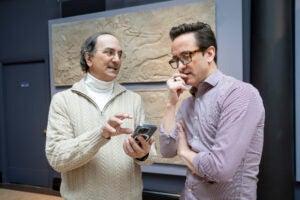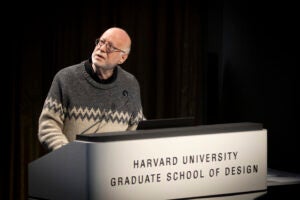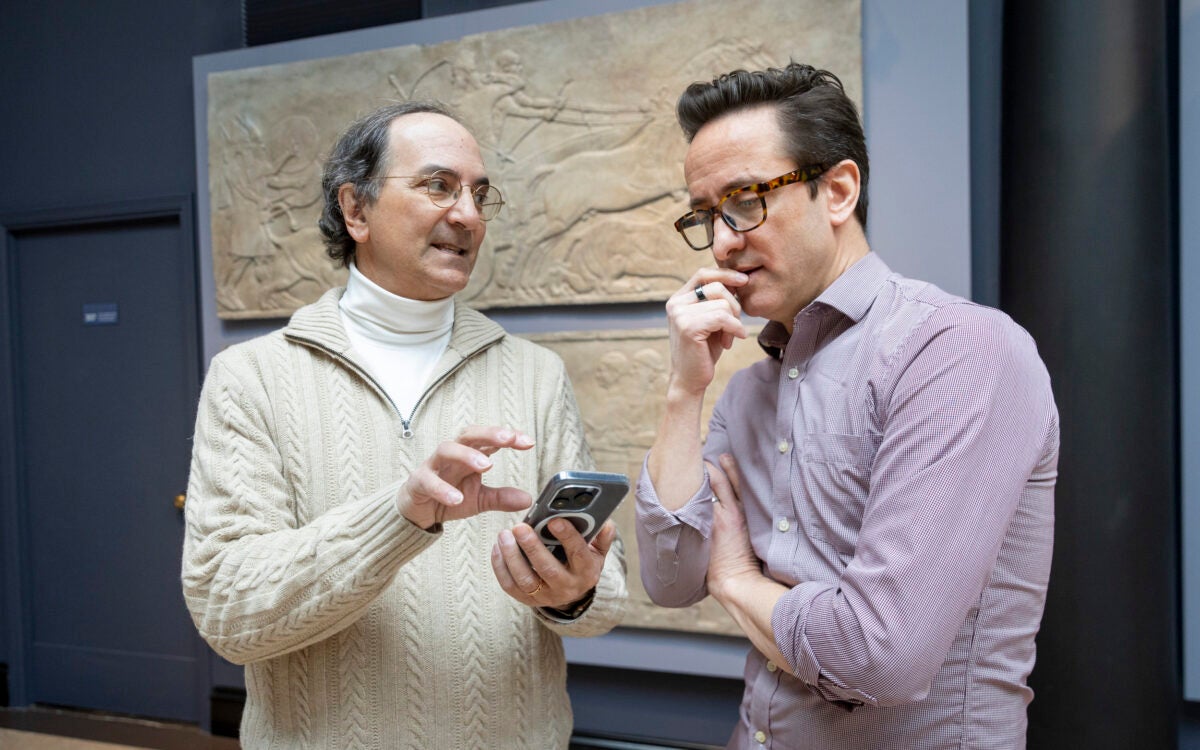Pros teaching prose
Not to mention poetry and playwriting
Clicking keyboards provide a soundtrack to the semester’s end, as students put finishing touches on term papers, theses, dissertations, and the like. But amid the flurry of traditional writing assignments, there are other projects afoot. Short stories, for example. Screenplays. Fiction manuscripts. Personal essays.
Creative writing flourishes at Harvard, encouraged by a vibrant program in the Department of English.
The Creative Writing Program offers intensive, semester-long courses in five genres: fiction, poetry, nonfiction, screenwriting, and playwriting. The workshops, all for-credit, are led by published, eminent writers who bring a wealth of knowledge to the classroom. Each course is limited to 12 students and requires an application for enrollment. Some courses cater to students with significant writing experience, while others are open to those making their first foray into the creative world.
“The courses provide a small and safe environment in which students can be comfortable taking creative risks,” said Bret Anthony Johnston, senior lecturer in English and director of the Creative Writing Program. “Whether a student is refining a piece for publication or simply trying a new genre, he or she can find a supportive setting.”
Thirteen workshops took place in the fall semester and 16 are currently under way this spring. The courses are open to Harvard undergraduates, graduate students, and staff, as well as cross-registered students from other universities.
Johnston, who has led the program for three years, said that he has witnessed an explosion of interest over the past few semesters. More than 250 students submitted applications for the spring 2009 workshops, up from 185 in the fall. Several new workshops have been added to meet the increasing demand, but class sizes remain small.
“We made the conscious decision to keep the class size limited to 12,” said James Engell, chair of the English Department and Gurney Professor of English Literature and professor of comparative literature. “Once you push past that number, the dynamic changes and the amount of attention from the instructor [is] markedly reduced.”
Though the number varies by semester, there are usually eight to 10 instructors teaching in the Creative Writing Program. Of these, a core group is devoted exclusively to the workshops and has no teaching obligations outside the program. These individuals are known as the Briggs-Copeland Lecturers. They serve five-year terms at Harvard, during which (in addition to teaching) they are encouraged to pursue their own writing projects and give public readings.
This year, the Creative Writing program welcomed three new Briggs-Copeland Lecturers: poet Joanna Klink, journalist Darcy Frey, and screenwriter Daniel Rubin. They join playwright Christine Evans, poet Peter Richards, and novelist Katherine Vaz. Novelist Claire Messud is also teaching in creative writing this year while she serves as senior fellow in the Humanities Center.
Other faculty who lead creative writing workshops include Jorie Graham, Boylston Professor of Rhetoric and Oratory; Jamaica Kincaid, visiting lecturer on African and African American Studies and on English; and Johnston.
The Creative Writing Program counts many published authors among its alumni, including Uzodinma Iweala, author of the widely acclaimed novel “Beasts of No Nation” (HarperCollins, 2005).
Writers at work
Regardless of their previous writing experience, students who enroll in creative writing workshops find that their projects are given the utmost respect and professional attention. In Advanced Playwriting 2: “Production Workshop,” students even have the opportunity to work with a team of professional theater artists.
The playwriting production workshop is the newest course in creative writing. It is officially led by Gideon Lester, current director of the American Repertory Theatre (A.R.T.), and Christine Evans, Briggs-Copeland Lecturer and playwright whose show “Trojan Barbie” is now playing at the A.R.T. But these dynamic artists are just two of many professionals involved. Actors and dramaturges from the Institute of Advanced Theatre Training at the A.R.T as well as visiting theater directors regularly attend class to work with students.
Each student was required to submit a finished play for entry to the workshop. They were then teamed with a set of theater professionals, with whom they have worked to develop their script for a staged public reading. Students’ plays will be read during the inaugural Harvard Playwrights Festival later this month at the New College Theatre. The initiative is supported by the Office for the Arts at Harvard and the Provostial Fund for the Arts and Humanities.
“We model the development process where playwrights learn to work with other theater artists,” Evans said. “This workshop is part of a broader effort to integrate academic study with the vibrant practice of theater on campus.”
The Evans/Lester workshop is not the only course where students engage in the type of activities required of a professional writer. For Rubin’s advanced screenwriting course, students are asked to practice rewriting, adapting, and pitching scripts.
“I want them to develop the techniques that they would use regularly as professional screenwriters,” Rubin said.
Intensive peer review has also become one of the hallmarks of the program.
“The opportunity for students to learn from one another is tremendous,” said Frey, who teaches two workshops on nonfiction writing. “My courses bring together writers from an array of backgrounds — not only English, but also science and law — and the cross-pollination of their interests produces a wonderful environment for discussion.”
Frey, like many of the Briggs-Copeland Lecturers, expressed a desire to equip his students with the tools of the writing trade so they can feel comfortable stretching their creativity.
“I want them to sense the possibilities of nonfiction as a genre, to realize the many things you can do with language,” he said.
Klink shared a similar sentiment.
“I want my students to become aware of all the expressive styles and sounds that are available to them as poets, and to feel that they can try out a particular voice without sacrificing their own,” she said.
In addition to the writing portion of the curriculum, the workshops include a reading component that features texts by published authors. These texts, which vary widely, often provide examples of technique or serve to spark writers’ imaginations.
Messud, who teaches fiction, considers reading to be an essential component of any writing workshop.
“We all have different strengths as writers,” she said. “The more we read, the more we can identify successful aspects of the craft and incorporate those aspects into our own work.”
But still, many agree, there is no substitute for the most important task of all: writing.
“Students teach themselves through writing and rewriting,” said Rubin. “If you don’t give them the opportunity, they just won’t learn.”




